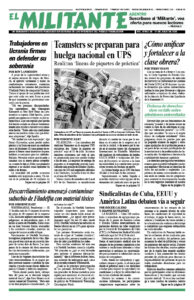On June 13 Keith and Valori Radonis, parents in rural Maine, filed a lawsuit against the state, challenging discriminatory school funding policies. This was the sixth lawsuit filed since 1994 against state officials seeking to uphold freedom of religion protected by the U.S. Constitution.
The Radonises and others had hoped a June 2022 decision by the U.S. Supreme Court meant they could use state-funded tuition aid to send their children to nearby St. Dominic Academy, a prestigious co-ed Catholic school.
The court had ruled that since Maine’s laws required the state to pay tuition for students to attend private schools in rural areas where there were no public schools, they could not discriminate and exclude schools from the program just because they are religious.
But Maine officials, anticipating the ruling, changed the state laws in an attempt to make the Supreme Court decision moot. State legislators added a so-called religious neutrality rule to its Human Rights Act, saying faith-based schools had to teach all religious views equally or be barred from state funding.
And it granted Maine’s Human Rights Commission — not parents or the schools — the final word on what schools teach about marriage, gender and family life. State law had previously exempted religious schools from those rules.
The impact was immediate. The two parochial schools at issue in last year’s Supreme Court case said they would not accept state funds under those conditions.
“What’s happened here is another set of unconstitutional hurdles have been put in place to prevent folks from accessing their town tuition and to send their children to the school of their choice,” Keith Radonis told the press. The state basically said, “Even if we lose this, we’re going to make sure that people of faith will never get to use this money.”
Maine legislators have publicly boasted about what they did. State Attorney General Aaron Frey has vowed to work with the governor and state legislature to prevent money from ever going to faith-based schools.
The state’s move was also applauded in the liberal press. In an opinion piece in the New York Times, law professor Aaron Tang, a former law clerk to Justice Sonia Sotomayor, tossed aside any concern for constitutional protections. He wrote, “The legislative fix made by Maine lawmakers offers a model for lawmakers elsewhere who are alarmed by the court’s aggressive swing to the right.”
As the Radonis suit points out, actions against the Catholic Church and schools have a long history in Maine and elsewhere. In the mid-19th century, as waves of immigrants arrived, particularly from Ireland, bosses posted “Irish Need Not Apply” at workplaces across the East Coast, to whip up anti-Catholic sentiments and divide working people.
Maine officials in 1854 declared that all students were required to read the Protestant Bible in school. In response, Catholic Bishop John Bernard Fitzpatrick tried to form a separate school for his parishioners. A mob stripped, tarred and feathered him.
In 1859, a Boston teacher whipped a 10-year-old Catholic student’s hands until he fainted for refusing to read from the Protestant Bible. Over the following days hundreds of Catholic students walked out in what became known as the “Eliot School Rebellion.” The incident helped spark the parochial school movement.
As more Catholic schools opened, bigots pushed government moves against them. In 1875 Maine politician James G. Blaine championed an effort to amend the Bill of Rights to bar any funding for Catholic schools. It narrowly failed. Today 37 states still have some form of “Blaine amendments” on the books.
Anti-working-class discrimination against Catholics continues today. In the first quarter of 2023, 69 Catholic churches were vandalized.

